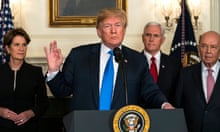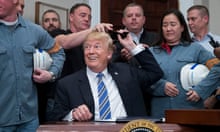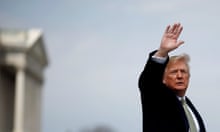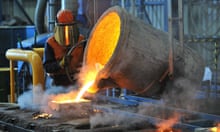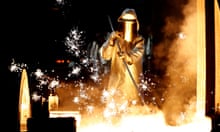Global stock markets have been rattled again by fears of a trade war between the world’s two largest economics after China retaliated to Donald Trump’s plan to impose tariffs on up to $60bn (£42.4bn) worth of Chinese products.
Hours after Trump announced the proposed import duties – which are expected to cover sectors such as robotics, hi-tech trains and aerospace – China said it had prepared retaliatory tariffs on about $3bn worth of US imports. Beijing urged Washington to negotiate a settlement as soon as possible.
A statement from the Chinese commerce ministry said: “China doesn’t hope to be in a trade war, but is not afraid of engaging in one. China hopes the United States will pull back from the brink, make prudent decisions, and avoid dragging bilateral trade relations to a dangerous place.”
The Chinese response sent shares in Asia tumbling on Friday, following Thursday’s 723 point plunge on the Dow in New York. The Nikkei 225 in Toyko closed 4.51% lower on Friday, while shares in Hong Kong fell 2.45%, the CSI300 in Shanghai lost 2.86% and the Kospi in Seoul was down 3.37%.
But shares in Europe fared better, recovering from their worst levels after what analysts said was so far a less dramatic response from China than had been feared.
Geoffrey Yu, the head of the UK investment office of UBS Wealth Management, said: “We see China’s retaliatory tariffs as relatively measured. Beijing is sending a clear signal that it would like to bolster its reputation as a defender of free trade and to avoid antagonising the situation further.
“This week’s tariff announcements are likely to cause disruption in the short-term but looking ahead, with both sides hinting that conversations are ongoing behind the scenes, we view this as the beginning of a long process towards an eventual resolution.”
Jasper Lawler, the head of research at London Capital Group, said: “$3bn is a splash in the ocean of US-China trade. If your glass is half-full, China’s measured response opens the door to negotiations. If you glass is half-empty, it opens the door to escalation.”
The FTSE 100 ended Friday down 0.44% at 6921.94 after falling to 6876, with the recovery helped by EU leaders approving a Brexit transition deal. Germany’s Dax lost 1.77% and France’s Cac closed 1.39% lower.
On Wall Street the Dow Jones Industrial Average closed 1.77% down, giving a weekly fall of 5.67% All three major US indexes recorded their biggest declines since January 2016..
The latest US sanctions on China are in addition to the 25% and 10% tariffs on steel and aluminium announced by Trump earlier this month. With regard to the steel and aluminium tariffs, the US president has given the EU, along with Australia, Argentina, Brazil, Canada, Mexico and South Korea, a temporary exemption until 1 May, while talks continue.
But despite this concession, Trump was accused of “putting a gun” to the EU’s head as Brussels called on the US administration to make the exemption permanent. The pause is being viewed in Brussels as an attempt by the White House to pile on the pressure and extract trade concessions on EU goods exported to the US.
Charles Michel, the Belgian prime minister, said: “I have the impression that the US leader wants to negotiate with the European Union by putting a gun to our head. That’s a strange way to negotiate with an ally.”
In response to the US tariffs on China, the Chinese foreign ministry suggested soybeans, aeroplanes, cars and cotton could be targeted.
Wine, apples and ethanol could also be in the firing line, which would hit agricultural areas where voters supported Trump in the 2016 presidential election.
The Chinese government could also target US technology companies that manufacture products in China, such as Apple, in the hope those firms would pressure Washington to back down, said Victor Shih, a professor of political economy at University of California, San Diego.




